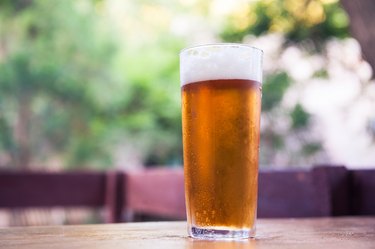
When attempting to lose weight, many dieters make the decision to cut out alcohol because it contains extra calories. Beer and weight gain often go hand-in-hand, and if you enjoy drinking beer and eating calorie-rich food regularly, losing weight can be particularly difficult. According to an April 2014 study in the American Journal of Public Health, alcohol consumption is related to not only weight gain, but also to obesity. If you want to lose weight but still drink beer, you will need to increase your exercise, change your diet and monitor the amount of alcohol you drink.
Drinking Beer and Losing Weight
Video of the Day
According to the USDA, one beer contains 153 calories. A craft beer, like Blue Moon, for example, clocks in at 171 calories, and some craft beers can even top 200 calories. According to Health.gov, the recommended calorie intake for women is from 1,600 to 2,400 calories per day and 2,000 to 3,000 calories per day for adult men. To fit beer drinking into a healthy diet, be conscious of the calories you are ingesting with each drink.
Video of the Day
According to the Harvard T.H. Chan School of Public Health, moderate drinking is associated with lower risk of cardiovascular disease. Moderate drinking is considered to be no more than one to two drinks a day for men, and no more than one drink a day for women.
Switch Up Your Beer Diet
Drinking beer and losing weight involve cutting calories from your diet. According to Nutrition.gov, in order to lose about a pound a week, you must burn or cut around 500 calories a day, which is why many dieters opt to cut liquid calories altogether. Switching to a light beer is a great way to reduce your caloric intake but still enjoy a drink you love. There are even several low-calorie, light craft beers on the market for beer connoisseurs.
The USDA lists 103 calories in a light beer, as opposed to the 153 in a regular beer. In addition, light beer contains about half the carbohydrates that regular beer does, and lower-carb diets are often associated with weight loss. This simple switch can help your body burn alcohol more quickly and keep your daily calorie intake in check.
Read more: Is Liquor More Fattening Than Beer?
Plan Your Meals
Another reason beer and weight gain are associated is that alcohol reduces your inhibitions and stimulates your appetite. People often eat more when drinking, so if you know you'll be tempted to snack after a beer or two, plan ahead. Prepare low-calorie snack options so that you'll stay on track with your daily calorie intake. Foods high in protein and fat can slow your body's absorption of alcohol, making you feel less drunk and less prone to overindulgence.
Read more: How to Meal Prep for Weight Loss Like a Pro
Drink More Water
You do not need to replace beer with water to lose weight. You should, though, drink one glass of water for every beer you ingest. Alcohol is a diuretic, which means that it dehydrates you. This, in part, is why you get hangovers. When you're hungover, you're often tempted to skip a workout because you don't feel your best.
If you're going to drink beer and lose weight, drink water before, during and after you consume alcohol. This way, you won't feel the need to reduce physical activity because of alcohol-induced sluggishness later.
Read more: A 10-Minute HIIT Routine That Will Torch Calories
Try Weight Training and HIIT
According to the American Council of Exercise, after a workout, certain forms of exercise lead to an increased metabolism that continues even after working out. High-intensity interval training (HIIT) and heavy resistance training have been shown to increase oxygen intake, which also increases your body's ability to burn calories even when you are at rest. This is called excess post-exercise oxygen consumption, or EPOC. The more intense the workout, the more calories your body will continue to burn afterward, including the calories from drinking beer and eating calorie-dense foods.
- Journal of Clinical Investigation: "Increased Brain Uptake and Oxidation of Acetate in Heavy Drinkers"
- United States Department of Agriculture: "Food Composition Database"
- Harvard T.H. Chan School of Public Health: "Alcohol: Balancing Risks and Benefits"
- Nutrition.gov: "Frequently Asked Questions (FAQs)"
- American Council on Exercise: "7 Things to Know About Excess Post-Exercise Oxygen Consumption (EPOC)"